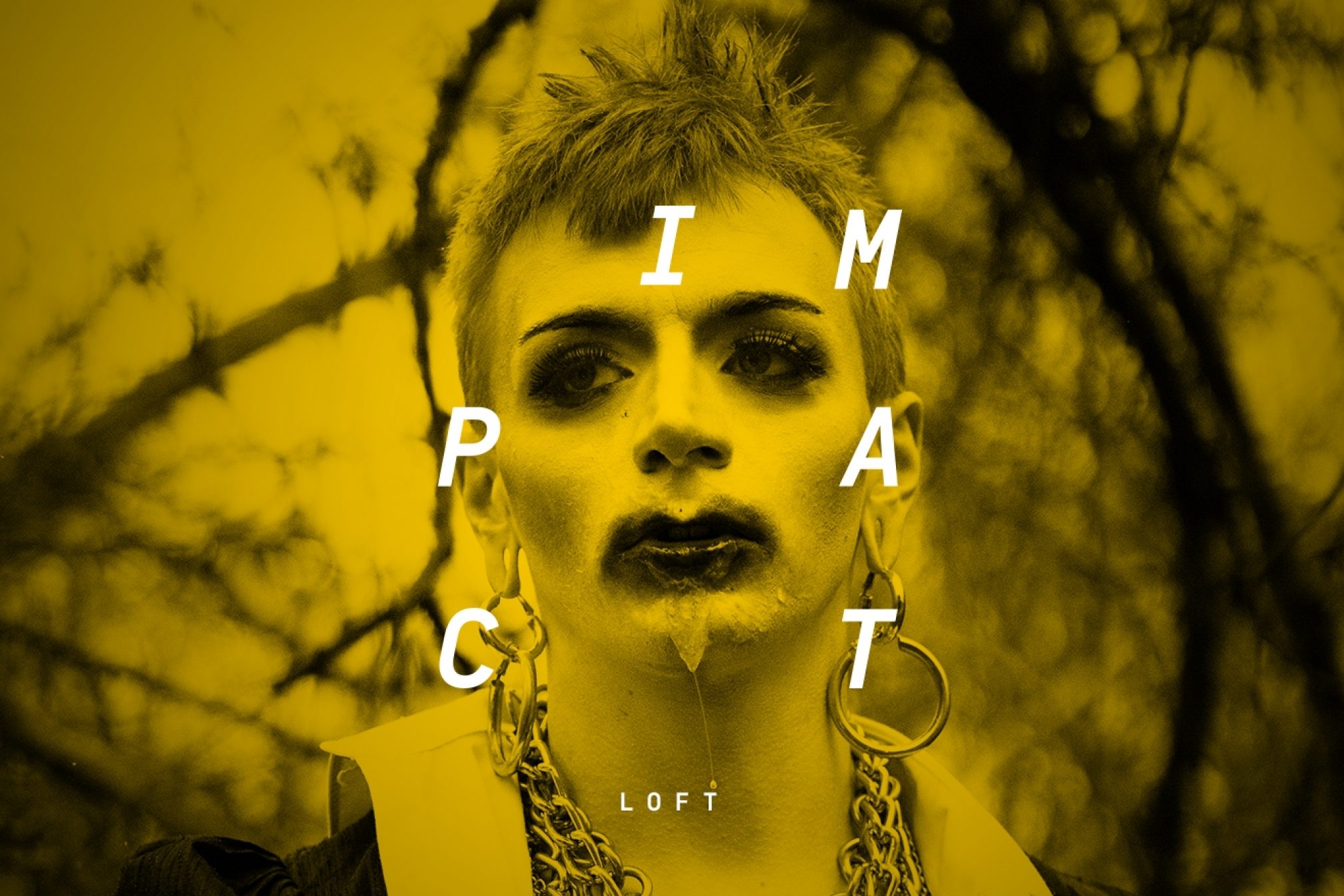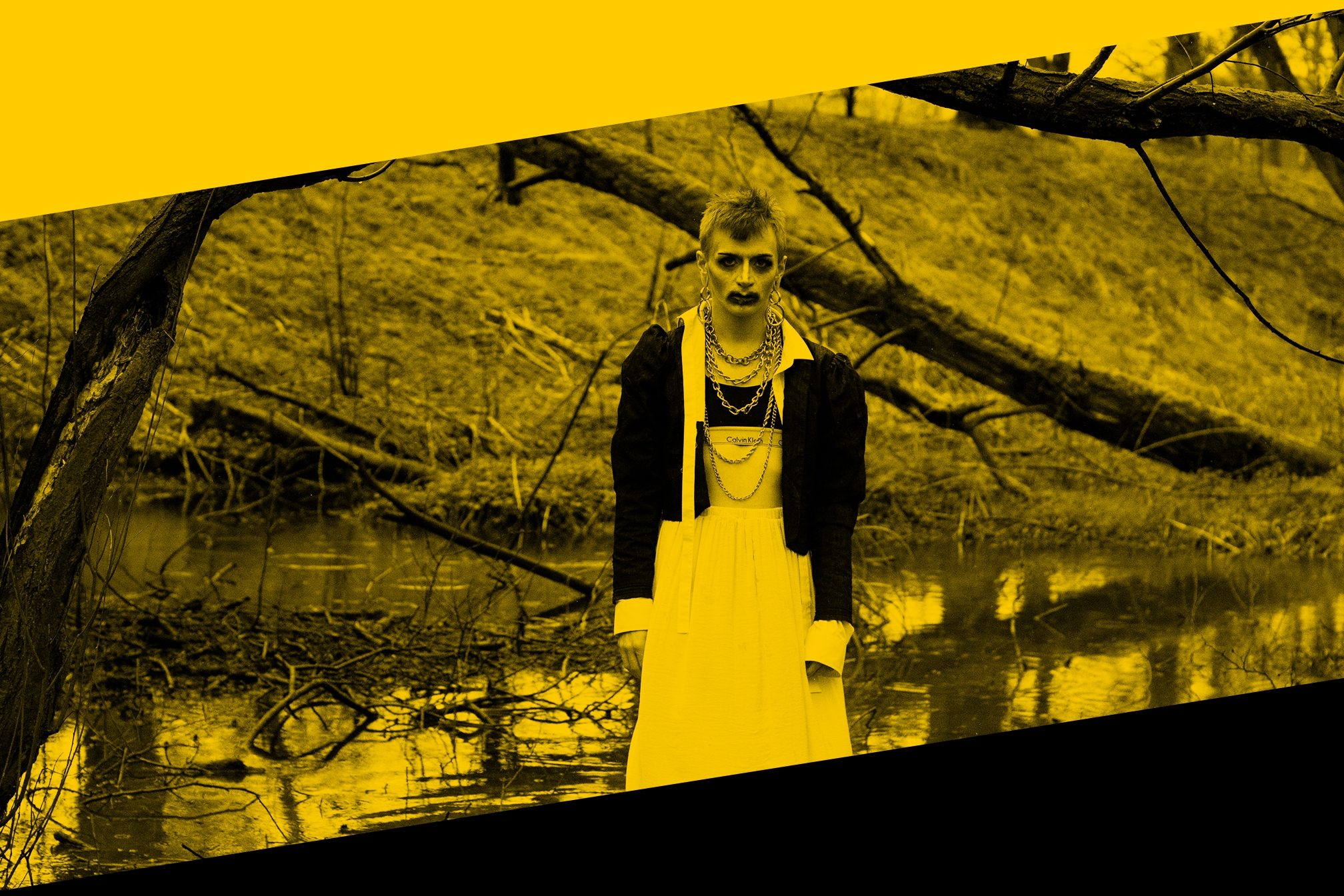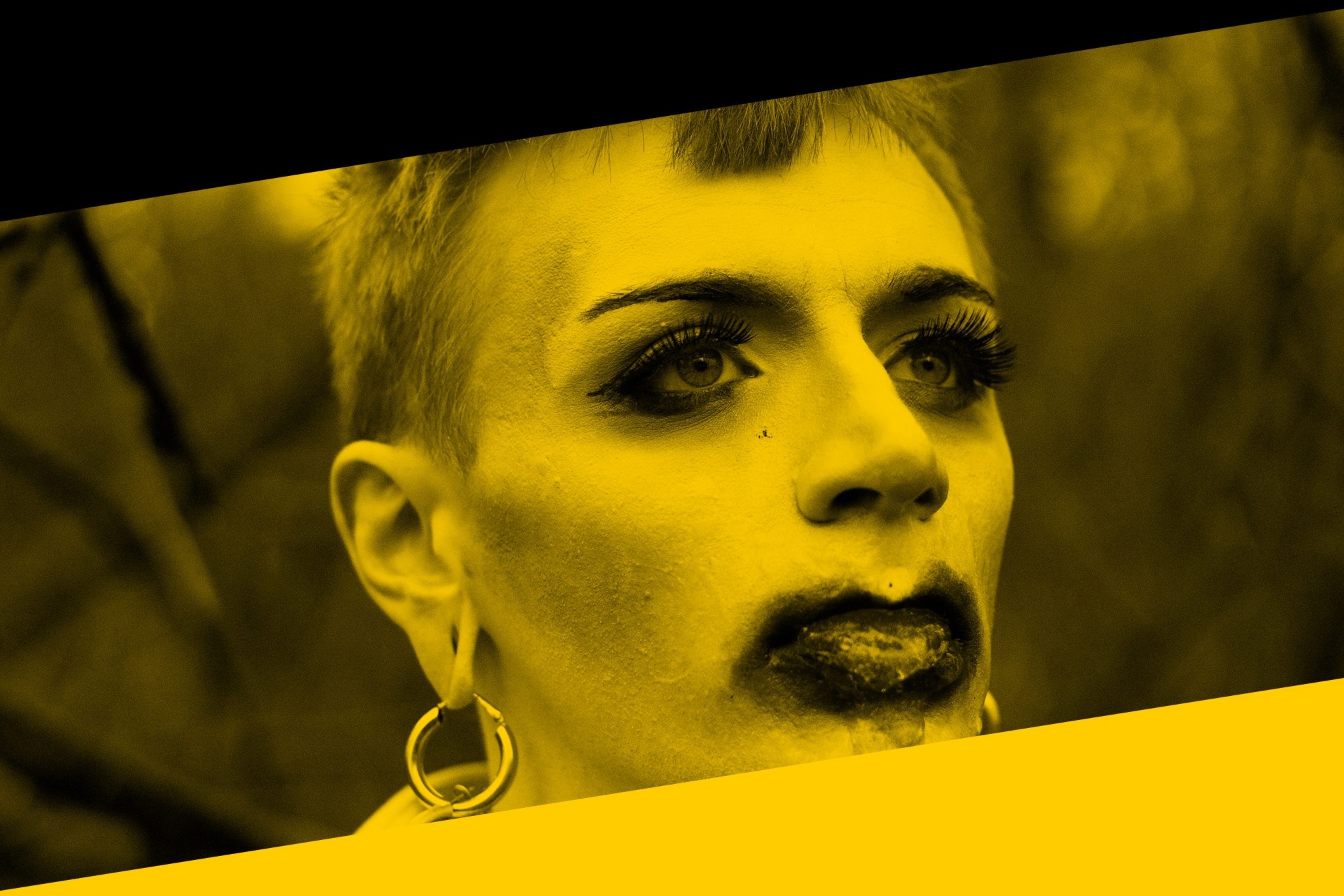 Impact
Impact
Meticulous self-curation: How LOFT is attaching a musical world to her identity
Tri Angle artist LOFT is creating her own distinct style through exploratory productions and sets
As a DJ, Aya Sinclair, aka LOFT, has a knack for theatrical, technically adventurous sets that explore woozy club, breaks and bootlegged material from her Mancunian clubland cohorts, a smattering of saccharine pop edits, and a relentless stampede of drums.
In her productions she takes this free-wheeling vision to the next level, best demonstrated through her various outings on the likes of Astral Plane and Wisdom Teeth, her sweeter-than-sweet 2018 mixtape ‘ell oh eff tea too oh won ate’, and her forthcoming Tri Angle Records EP ‘and departt from mono games’.
Musically, it’s easy to draw parallels between LOFT and her favoured artists, who include the likes of Björk (who is a fan in return, featuring LOFT’s track ‘Funemployed’ in her December 2018 Mixmag cover mix). “All of my favourite artists have some sense of a narrative or a consistent identity that runs through everything that they do,” says LOFT. “I’m kind of obsessed with noticing the ways in which the identity in itself is bigger than the style of music they make.”
On the eve of her new EP release, LOFT is turning in a dynamic Impact mix complete with tracks from friends, family and obscure industry names alike. From Anz and Patrick Flint via Limewax, Chants, Air Max ‘97 and more, listen to the mix and read a Q+A with LOFT below.

So, you’re based in Manchester. It seems like even though people focus on cities like London, Manchester's got a really authentic, dedicated underground community.
We definitely have a very strong and vibrant community; perhaps it’s because the scene isn't huge, which means there are just enough people coming through that there’s a really nice variety of new stuff happening all the time. But conversely because it's not massive, everyone is able to have an idea of what everyone else does. So, when someone new comes through, they get linked with the right people pretty quickly. People are always looking out for each other here, supporting each other’s events and stuff like that. I’ve definitely felt more welcome and supported here than anywhere else I’ve lived.
Say it's a reader's first time clubbing in Manchester. Where would you take them?
I would ideally take them to a Mutualism night, a party run by a bunch of really close friends of mine. They’ve just had 2K with aamin, Zaleel and the absolute babe Clemency. But also, they've had people like Mun Sing, rkss, Hesska. Not to forget Scope Plus, the interdisciplinary arts festival they organised in 2017 where I played alongside artists like Visionist, Giuseppe Ielasi and BFTT. Mutualism is a collection of the people closest to my heart and I really admire all of the hard work that goes into their running events, I would totally be involved if I wasn't doing all this other stuff!
Asides from them, I’d recommend a Strange Riddims event, a nine-person onslaught of the most gully silliness. Picture the scene: Dizzee Rascal’s ‘Trapped’ instrumental into the 2008 UEFA theme ‘Samba De Janeiro’ into a hardstyle edit of Bobby Caldwell’s ‘What You Won’t Do For Love’. The most delightful chaos! Either that or, of course, a boygirl night when the planets align for the next one.
For readers who aren't aware of what you do with boygirl, can you tell us a bit more about it?
Sure! boygirl is a queer-dominated DJ collective. We want to be clear that in choosing that terminology we are defining our collective in terms of inclusivity, and that entrance into our spaces – be that in playing with us, aligning yourself with us or, most importantly, coming to our parties – isn’t contingent on some stale notion of performative queerness! boygirl is not a space exclusively for queer people but rather a space where queerness is brought to the forefront to challenge hand-me-down perspectives on queer culture.
It's a space where we can slam together the aggy macho music like grime and bassline we grew up on into some of the softer, sexier or queer-empowering tracks we’ve discovered along the way. All without having to worry about getting sparked out for presenting ourselves as we wish! At the moment, the collective is Iceboy Violet, MICHAELBRAILEY, Leo, salt pillar and me. We've had people come and go, and we're open to membership being fluid as and when people feel they can. We really want to get a more regular party off the ground in the future. Look out for an exchange we're planning later this year with a crew called MP3 [More Pussy 3mpire] based down in London.
How did you get into production or even just DJing? Did you discover them at the same time?
At different times. I've been playing instruments since before I remember. I started out playing drums when I was about six years old, and then started playing guitar and piano a couple years later. My dad was a very early adopter of tech, we had internet in our house in like, 1998. He was getting cracked bits of software off his mates, swapping burned CDs around. The first piece of production software I came into contact with was Sony Acid - version 3.0, I think? I just used to drag in loops and pile up as many channels of drums as possible. I didn't really start taking it seriously until I was about 13 years old or so. There was a cracked copy of Ableton Live 2.0 that my dad had found somewhere, and he was like, ‘This seems pretty interesting, maybe you want to check this out’. I started messing about with Live then and haven't looked back since.
As far as DJing’s concerned I’d say I started when I was in college. The line blurs because I see the beginning of me actually DJing as when I started DJing vinyl. Before that I was doing something that was some kinda strange synthesis of live and DJ sets with a MacBook and Launchpad – and not being allowed near any soundsystems. It all really came together when I learned to beatmatch. I learned through a friend at college who had the best dubstep collection I think I’ve ever encountered, all the early Tempa releases, loads of Chestplate, loads of early Deep Medi, literally every DMZ record – he even had DMZ007! Biggest shout out to Pada!
What kind of process did you go through to develop the music you wanted to make and the sound you wanted to put out?
I definitely learned through a process of imitation and recombination. There’s a load of old self-released records floating around the web under different aliases which a couple of people have found. On those earlier EPs, it's like ‘an imitation of a tech house tune’ or ‘here's an attempt at a slowfast d‘n’b track’. It was about learning all of those sound worlds, all the tropes, so that when I had an understanding of the forms and sound palettes of different genres, I would have the ability to repurpose and reform them as I wished. It was a very similar process to learning to play drums. I learned to drum through listening to break-oriented records: James Brown, Roni Size, Portishead and so on. So then when I was playing in post-rock or metalcore bands later on, I kind of had the chops when we wanted to do something a little outside the standard form.
It's interesting though you started out with drums, because now, they form quite a big part of your electronic music repertoire. As a kid, I'm sure you didn't think you'd be using them how you do today.
I think up until I started DJing vinyl, I was dead set on becoming a touring professional drummer. Maybe there was a moment where I thought ‘hang about a second’ and did a bit of maths, and realised maybe, just maybe, this solo career thing is probably a better idea! Nah I jest, it wasn't that cynical! It was more about having a bit more control over the way I present myself and my work.

Visuals, identity and creating an overarching world seems to play a big role in your wider creative process. Would you say that’s the case?
All of my favourite artists have some sense of a narrative or a consistent identity that runs through everything that they do. I’m kind of obsessed with noticing the ways in which the identity in itself is bigger than the style of music they make, but how there’s then a self-similarity of their identity imprinted on each detail of their work. Take someone like Björk for example, she's done such a wide range of things but the meticulous self-curation of her image is so consistent and the way that she sounds is so consistent, despite how varied the aesthetics are record to record. This is very, very important to me. I want my work to be understood as part of a continuous narrative, for an audience to able to hear one of my pieces of music and it be both immediately recognisable as part of a wider identity that is ‘LOFT’, but also to stand alone and speak for itself.
How did you get you get involved with Astral Plane Recordings?
I became really good friends with Acre when I was around 19. We met at one of his shows and pretty much immediately started sending tunes back and forth over email. After a while, he invited me to guest on his Radar Radio show. I'd never done a proper radio slot before and I was so nervous. To make things worse, we'd been to Corsica the night before and I was super, super hanging. As such, I clanged pretty much every single mix. Gabe, who runs APR, was listening in on the off-chance. He really enjoyed the variety of my selections despite my messy blends so got in touch after for a mix for the label’s mix series. We had really great correspondence from the get-go. Gabe is one of my closest friends and definitely among my favourite people to work with. He has a very nuanced sensibility about his work and the scene he’s a part of. It's like what I was saying earlier about knowing all of the individual pieces, so you can construct your own microcosm. I feels like he's doing that too, I suppose it's why we work together so well.
How does it feel to be pegged as a 'rising star' or 'one-to-watch?' Is there a lot of pressure that comes with that?
It's been a long ride even to what feels like the starting block. I've been writing music for as long as I can remember and writing electronic music for over 10 years. Even so, the whole 'rising star' thing is nice, it's like a sense of arrival. I don't feel too much pressure about it. I've taken a lot of time to take as much pressure off myself as possible. I don’t hammer in writing tunes every day. I've tried to do that, and it just doesn't work for me. I have to work when the time's right, and when I can make measured decisions about the work I’m making.
We can’t do an interview and not discuss your brand-new Tri Angle EP! How did that come about, did you have the project before you started working with the label, or vice versa?
Well, this record was half finished. The way the record works is that every single track has been finished, exported as stems, and then brought back in, and then finished again, exported as stems and so on. That way, you get these layers and layers and layers of tweaks over the top of each other. I guess I'd finished maybe a second pass of it and been approached by a couple different labels. There was a bit of a kerfuffle with another label, and long story short, I did a really immature thing and mouthed off about it on Twitter.
Around the same time, I’d been speaking to Robin from Tri Angle about working together. He saw my little Twitter rant and reached out like ‘Do you need a hand?’. He called me up, we spoke for a long while and he was just super calming and really helpful. I just wanted the record behind me and out in the world. I was so tempted to just share it on Bandcamp as a free download, but he told me, ‘Look this is a great record, hang onto this.' It was exactly the little bolt of confidence that I needed because I really wasn't in a good place. In the end, the process of getting this out has been pretty long but the timing of each event was kind of perfect.
Can you tell me a little about the ‘crisis of identity’ you were referring to when discussing the album’s creation in the press release?
This record has been written across a very tumultuous time. I was going from working 40+ hours a week in a bar and dealing with a functional drinking problem as I see a lot of creative people working in bars do, being in quite an intense relationship that was falling apart and having a very brittle understanding of myself. I went into work one day and I'd handed in my notice, broken up with my partner and shaved my head. One of my colleagues was like, 'Are you having a 2007 Britney moment?’. I started hormone replacement therapy about three months after that. I believe this is what is referred to as a “big mood”. From that crisis moment, I decided I was done with catering and hospitality. I’ve been very fortunate to be able to hold onto that.
It's no wonder you wanted to get it out if you had all of this going on while you were making it.
I was definitely cycling through, ‘This is great work, I'm really proud of this’ and ‘Fuck this, I hate this, I can’t bare to listen to it again’. I think that’s fairly common among musicians anyway, but I think that cycle hit me especially hard this time because the record is so rooted in processing all of the changes in my understanding of myself. I'm in a really comfortable place with myself now, but I’d say we can quite clearly hear in this record that I wasn’t having the best time a couple months ago you know?
And finally, talk us through your Impact Mix.
I just wanted to share some music from people who are really close to me, but then also you know, Limewax and NHØP?! I’ve built up a platform by now and I want to use that to help the people around me that are making incredible work.
LOFT’s ‘and departt from mono games’ EP lands on Tri Angle Records on May 3.
Jasmine Kent-Smith is Mixmag's Staff Writer. Follow her on Twitter
Tracklist:
Croww - Peristalsis
Niels-Henning Ørsted Pedersen - Samba Petit
BFTT - 75623372 2
Patrick Flint - Needs of the Business
hence therefore - Census, Map, Museum
Anz - No Harm
BFFT - Mauldeth
Chants - Seven Spheres
Air Max ‘97 - Falling Not Walking
Moonstones - Yen Pox
M.D. James - Broadside
Koenraad Ecker - Between the desire and the spasm (falls the shadow)
xin - ????
Daniel Ruane - Nest [LOFT hibernation loop]
Limewax - Acitate
Hatcha & Lost - King Of The Trees
Dubtronic - Screwface 2
DALIB - dschungle
Ariana Grande - One Last Time (Starfox94’s Lonely Footwork Mix)
ICE UNDERLORD - SEVYN STREETERSEX ON THE ROOF MELTDOWN
Tami T - Trans Femme Bonding
CT Zen 97 - Leaving
Read this next!
“Space for experimentation”: VAJ.Power’s fusion of AV and bassweight is fortifying Glasgow’s low-end legacy
Get to Know Angel-Ho, the artist fusing neo-pop anthems with a gritty club mentality
Lotic is the sound and spirit of experimental dance music



